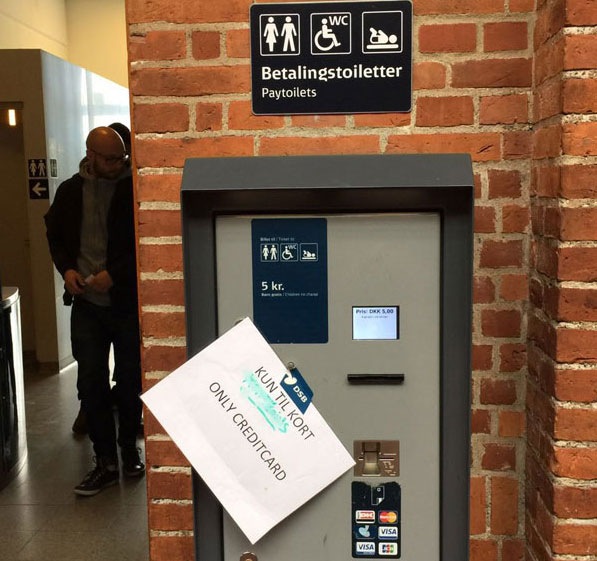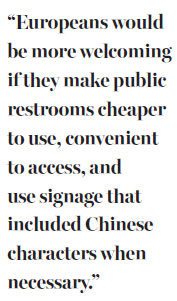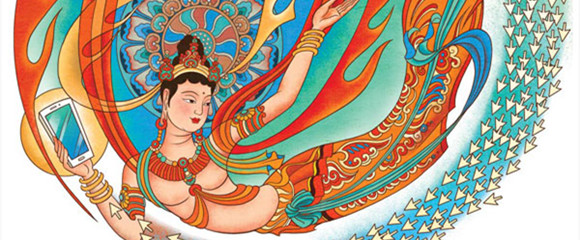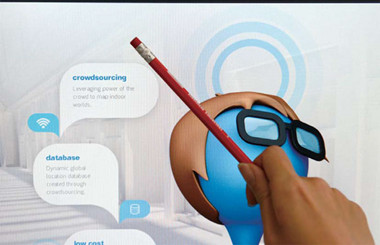Spending a pretty penny can be confusing
Updated: 2016-05-13 08:28
By Fu Jing(China Daily Europe)
|
|||||||||
 |
|
A credit-card-only toilet in central train station in Copenhagen may cause problem to enter for those who don't hold card. [Photo by Fu Jing/chinadaily.com.cn] |
Chinese may balk at paying for public restrooms in Europe, but first they need to find one
Many people see the state of a nation's public toilets as a gauge of its prosperity. I know I do.
During a recent business trip to Copenhagen, I rolled my suitcase into the hall of the central railway station and followed the signs to find a restroom. It wasn't hard, and when I eventually arrived I was required to pay 5 krone (75 cents US; 65 cents euro). This resulted in me searching my pockets for coins.
With coin in hand, I looked around for a slot at the entrance, only to find tucked inside was a piece of paper that read, in English and Danish, "Credit card only". Fortunately, I had a card with me, and I was quickly allowed in without the need to enter a pin number.

The toilet was clean, as are many in Europe. However, the credit card notice astonished me.
I shared my experience at the train station on WeChat, the Chinese social media app. In response, many people asked what might happen if someone doesn't have a credit card? Some expressed their understanding that using credit cards is popular in Denmark. Some were shocked that you had to pay at all to enter a public toilet in Europe.
Five krone is about the average in Europe, but my most expensive experience was in Lucerne, Switzerland. I was doing an interview in a tourist spot there two years ago and had to pay 2 francs ($2; 1.8 euros) to use a train station restroom.
That means the cost of using a public toilet in some places is higher than the average daily per capita income in some less-developed countries.
Interestingly, despite higher living standards and a sophisticated financial services sector, Denmark and Switzerland have fully recognized the market economy status of China, which generally lags behind in terms of the hygiene of its public restrooms, either on the street, at stations or at tourist attractions.
Generally, the sanitation level of public toilets in Europe is satisfactory. Yet they are few and far between, and sometimes it can be a challenge to find one.

On most occasions, users will be charged to use such facilities, even in places like McDonald's. In some outlets, if you eat there, a password to gain access to the restroom will be printed on the receipt.
Today, growing numbers of Chinese are traveling in Europe. For many, especially elderly Chinese, who don't use credit cards, there is a potential cultural shock in Copenhagen. And those who are thrifty will likely try to reduce the frequency of using public toilets in Switzerland.
What's more, many cannot speak European languages, although they can usually find a public restroom by following the universally recognized male and female figures used on most signboards.
In some places, they use words instead. Again, the Chinese are full of wisdom. I remember a friend who told me that, although he can't speak English, he'd learned while in the UK to follow the sign that begins with "M" - as in men's - to ensure he went into the correct side of the toilets.
I wonder what he would do if he spotted a sign that just had "gentlemen".
Europeans would be more welcoming if they make public restrooms cheaper to use, convenient to access, and use signage that included Chinese characters when necessary. At the very least, they should simply stick to the universally accepted figures for men and women.
The author is deputy editor of China Daily European Weekly.
Contact the writer at fujing@chinadaily.com.cn
Today's Top News
China urges EU to honor MES status, despite parliamentary vote
Generation of new imams preach peace
Streaming stars
China vows to step up anti-corruption co-op
Chinese entrants in public speaking contest fight hard
Global anti-corruption summit opens in London
Britain raises threat of terror attacks to higher level
Chinese students to benefit from EU rules easing
Hot Topics
Lunar probe , China growth forecasts, Emission rules get tougher, China seen through 'colored lens', International board,
Editor's Picks

|

|

|

|

|

|







